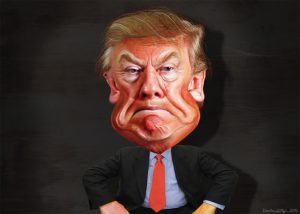 What happens if Donald Trump drops out of the presidential race? Some Republican politicians have begun to call on Mr. Trump to step down as the Republican nominee for President (he cannot be forced out). If this happens, the Republican Party would then select a new nominee for President.
What happens if Donald Trump drops out of the presidential race? Some Republican politicians have begun to call on Mr. Trump to step down as the Republican nominee for President (he cannot be forced out). If this happens, the Republican Party would then select a new nominee for President.
It might be conceivable for Donald Trump to voluntarily step down, and for the Republican Party to select an alternative nominee. However, the real issue is whether the name of the alternative nominee would appear on the ballots of a sufficient number of states to permit an Electoral College victory. At this late date in the election cycle, the names of presidential candidates on absentee ballots have already been finalized in many states. In fact, early absentee voting using the final ballots already is underway in Wisconsin and many other states such as California, Ohio and Indiana. Every day, more state deadlines for placing names on the ballot pass, and it is probably already too late to prevent Donald Trump’s name from appearing as the Republican nominee on a majority of the ballots used by states across the country. To get state officials to print new ballots and then allow re-voting of ballots already turned in would require 1) litigation in state courts across the country and 2) the willingness of a large number of these state court judges to adopt an unprecedented procedure based upon vague “emergency” arguments. Such a high stakes multi-state litigation effort would make the combative Bush v. Gore lawsuit look like a law school moot court competition in comparison.
One possibility, if Donald Trump steps down, is for the Republican Party to urge voters to select Trump’s name on the ballot, while promising that the electors in the Electoral College who get selected as a result would in actuality cast their Electoral College votes for an alternative nominee. In other words, “vote for Trump and get Pence (or Cruz or Rubio).” The difficulty with this strategy is that many states have laws requiring electors to cast their vote in the Electoral College for the actual person named on that state’s ballot. If these electors follow their state’s law, there probably wouldn’t be enough Electoral College votes available for the Trump alternative to win. Some have argued that these state laws violate the U.S. Constitution, and that electors are free under the Constitution to vote their conscience. However, it would take a lawsuit in federal court to secure a ruling to that effect, and without Justice Scalia anchoring a 5-vote conservative majority on the U.S. Supreme Court it is hard to envision any federal court adopting this argument. Would a three judge panel of the U.S. Court of Appeals really make such a consequential ruling, given the current deadlock on the high court and the knowledge that its ruling would be final?
In fact, the reason why both of these scenarios to replace Trump as the nominee are longshots is that both require judges to throw out existing procedures under state law while in the midst of an election campaign. Judges should hesitate to change the rules in the middle of an election, just because one political party finds itself at a disadvantage under the existing law. Donald Trump is the nominee chosen by the Republican Party, and it is not the job of the judiciary to ameliorate the consequences of that selection.

Rick Hasen’s analysis on this point:
http://electionlawblog.org/?p=87310
And the New York Times analyzes the issue, along the same lines as my comments:
http://www.nytimes.com/2016/10/09/us/politics/gop-trump.html?hp&action=click&pgtype=Homepage&clickSource=story-heading&module=b-lede-package-region®ion=top-news&WT.nav=top-news
The elections have turned into the new “reality tv”…